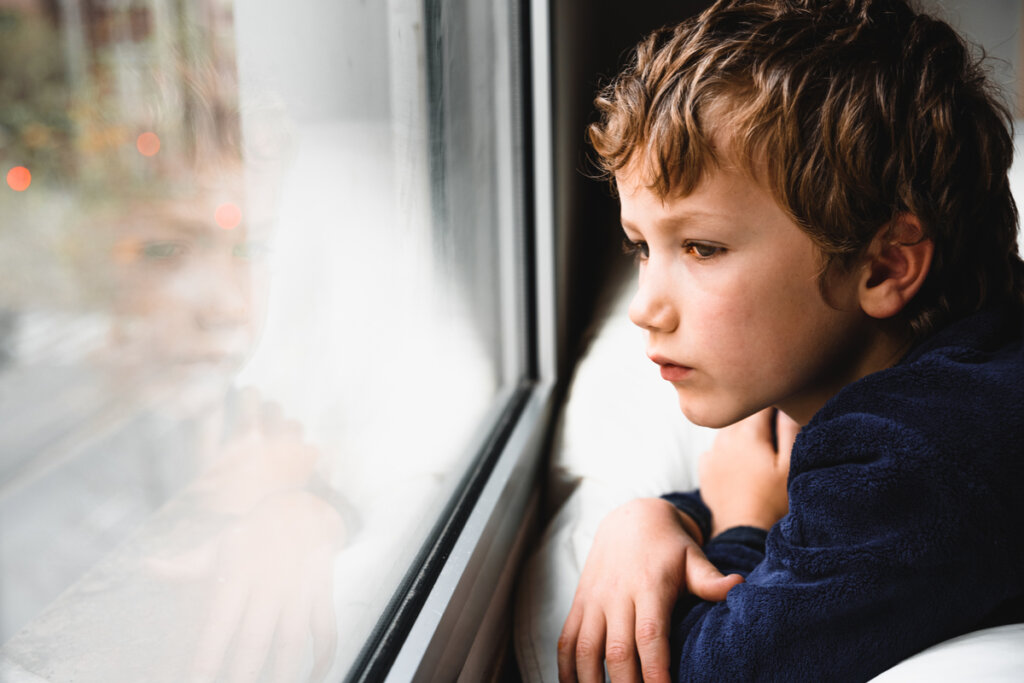The Danger of Labeling People


Written and verified by the psychologist Valeria Sabater
If you had to use one word to define yourself, what would it be? It isn’t really easy to compress in one term the perception you have of yourself is it? However, there are those who don’t find it so difficult. That’s because, since they were small, they’ve been labeled. In effect, they’re defined by how others see them.
“Charles is like his father, really serious and withdrawn.” “Andrea is smart, but not so talkative”, “John is disorganized and slow”, “Beatrice is mischievous and a little crazy”. Few acts could be less beneficial (and common) than giving children labels at such an early age. That’s because they have no filters and believe everything they’re told.
Labeling means prejudging and assigning a series of expectations to which many of us end up adjusting ourselves from a young age. We internalize external narratives and make them our own, engulf them, and dilute them in our personalities almost without realizing it.
Psychologists find many people in their consulting rooms who have no trouble defining themselves. “I’m a depressed person with no ambition” many say. Certainly, their attitudes, emotional states, and behavior testify to this, but their origin is often to be found in harmful messages projected from their own environment.
Many of us define ourselves by labels that others projected on us or that we ourselves internalize. These harmful presences give rise to self-limiting beliefs.

Labeling people changes their self-perception
Labels are a primitive mechanism that allows us to delimit (simplify) reality. They’re practical and are an essential resource for our brains. In fact, labels help us make sense of a world that’s almost always complex and diffuse. Labeling also gives us a clear sense of control. It’s like having certain cardinal points with which to orient ourselves in different scenarios.
However, the problem is that every time we label something or someone we tend to also identify it as good or bad. That’s because language isn’t neutral, it has meaning and also implications. For example, if a person’s labeled as ‘toxic’, we’ll try not to interact with them. Or, if a child is labeled as ‘slow’, we’ll assume that they won’t be able to learn properly.
Sadly, we aren’t fully aware of how easy it is to label or obtain a first impression that we later tend to confirm. These quick responses with which we try to have control over reality have been studied since 1930. In fact, it was the linguist Benjamin Whorf who explained that the words we use to describe what we see are rarely objective but loaded with biases.
This custom has serious consequences. Because, when we label people, we deny their complexity, their right to change, and their richness as human beings.
Destroying self-concepts versus the Pygmalion effect
As we mentioned earlier, we tend to start labeling children right from when they’re small. For example, think of the mom or dad who tells their child that “You’re really annoying, honey. You’re a complainer… you complain about everything”. In this sentence, two labels are evident: You’re annoying and you’re a complainer.
Being labeled as annoying can make that child feel that their needs aren’t important. They’re ignored because they complain excessively, hence they start to assume that expressing what they need isn’t good. Furthermore, their self-perception takes a turn and they may even start to devalue themselves as a result.
The opposite may also be the case. Proof of this can be found in a well-known study conducted by doctors Robert Rosenthal and Lenore Jacobson. A group of teachers was told that certain students in their classes were smarter than average. However, there was no evidence that this was the case.
After giving the teachers this information, the researchers returned at the end of the school year. They found that the children who’d been designated as the brightest were 10-15 points higher in their IQ than their peers.
It was the Pygmalion effect and positive labeling that caused this. The teachers validated the false ideas and labels that the researchers gave them. It meant they treated those students differently. That favoritism, attention, and trust in them paid off.
Labeling can act as a self-fulfilling prophecy. When we believe that something others say about us is real, we end up validating it with our beliefs and behaviors.

Labels are tunnels that close our realities
When we label a person, we can reinforce or devalue them. Sadly, in today’s society, labeling is unkind, unhelpful, and not at all beneficial. Indeed, in our day-to-day, we’re already pigeonholed according to race, gender, class, and sexual orientation and we must also deal with other labels like sensitive, weak, naive, selfish, etc.
Most labels hurt because they’re loaded with bias and prejudice. Actually, these terminologies say more about who says them than those who are on the receiving end. That’s because those who use them have an extremely limited perspective of reality. They only see what they believe, not reality. However, in their attempt to control the complexity of others, they distort everything and reduce it to what it’s not.
It’s best to try and have a slightly more open and flexible view of life, people, and events. We should avoid easy and quick labels and take care of our language which can do so much damage without us even realizing it. From a personal point of view, let’s also try to deactivate and remove the arsenal of labels stuck inside ourselves.
Indeed, let’s eliminate those labels that others placed on us and which we validated. We must prevent them from becoming self-fulfilling prophecies.
If you had to use one word to define yourself, what would it be? It isn’t really easy to compress in one term the perception you have of yourself is it? However, there are those who don’t find it so difficult. That’s because, since they were small, they’ve been labeled. In effect, they’re defined by how others see them.
“Charles is like his father, really serious and withdrawn.” “Andrea is smart, but not so talkative”, “John is disorganized and slow”, “Beatrice is mischievous and a little crazy”. Few acts could be less beneficial (and common) than giving children labels at such an early age. That’s because they have no filters and believe everything they’re told.
Labeling means prejudging and assigning a series of expectations to which many of us end up adjusting ourselves from a young age. We internalize external narratives and make them our own, engulf them, and dilute them in our personalities almost without realizing it.
Psychologists find many people in their consulting rooms who have no trouble defining themselves. “I’m a depressed person with no ambition” many say. Certainly, their attitudes, emotional states, and behavior testify to this, but their origin is often to be found in harmful messages projected from their own environment.
Many of us define ourselves by labels that others projected on us or that we ourselves internalize. These harmful presences give rise to self-limiting beliefs.

Labeling people changes their self-perception
Labels are a primitive mechanism that allows us to delimit (simplify) reality. They’re practical and are an essential resource for our brains. In fact, labels help us make sense of a world that’s almost always complex and diffuse. Labeling also gives us a clear sense of control. It’s like having certain cardinal points with which to orient ourselves in different scenarios.
However, the problem is that every time we label something or someone we tend to also identify it as good or bad. That’s because language isn’t neutral, it has meaning and also implications. For example, if a person’s labeled as ‘toxic’, we’ll try not to interact with them. Or, if a child is labeled as ‘slow’, we’ll assume that they won’t be able to learn properly.
Sadly, we aren’t fully aware of how easy it is to label or obtain a first impression that we later tend to confirm. These quick responses with which we try to have control over reality have been studied since 1930. In fact, it was the linguist Benjamin Whorf who explained that the words we use to describe what we see are rarely objective but loaded with biases.
This custom has serious consequences. Because, when we label people, we deny their complexity, their right to change, and their richness as human beings.
Destroying self-concepts versus the Pygmalion effect
As we mentioned earlier, we tend to start labeling children right from when they’re small. For example, think of the mom or dad who tells their child that “You’re really annoying, honey. You’re a complainer… you complain about everything”. In this sentence, two labels are evident: You’re annoying and you’re a complainer.
Being labeled as annoying can make that child feel that their needs aren’t important. They’re ignored because they complain excessively, hence they start to assume that expressing what they need isn’t good. Furthermore, their self-perception takes a turn and they may even start to devalue themselves as a result.
The opposite may also be the case. Proof of this can be found in a well-known study conducted by doctors Robert Rosenthal and Lenore Jacobson. A group of teachers was told that certain students in their classes were smarter than average. However, there was no evidence that this was the case.
After giving the teachers this information, the researchers returned at the end of the school year. They found that the children who’d been designated as the brightest were 10-15 points higher in their IQ than their peers.
It was the Pygmalion effect and positive labeling that caused this. The teachers validated the false ideas and labels that the researchers gave them. It meant they treated those students differently. That favoritism, attention, and trust in them paid off.
Labeling can act as a self-fulfilling prophecy. When we believe that something others say about us is real, we end up validating it with our beliefs and behaviors.

Labels are tunnels that close our realities
When we label a person, we can reinforce or devalue them. Sadly, in today’s society, labeling is unkind, unhelpful, and not at all beneficial. Indeed, in our day-to-day, we’re already pigeonholed according to race, gender, class, and sexual orientation and we must also deal with other labels like sensitive, weak, naive, selfish, etc.
Most labels hurt because they’re loaded with bias and prejudice. Actually, these terminologies say more about who says them than those who are on the receiving end. That’s because those who use them have an extremely limited perspective of reality. They only see what they believe, not reality. However, in their attempt to control the complexity of others, they distort everything and reduce it to what it’s not.
It’s best to try and have a slightly more open and flexible view of life, people, and events. We should avoid easy and quick labels and take care of our language which can do so much damage without us even realizing it. From a personal point of view, let’s also try to deactivate and remove the arsenal of labels stuck inside ourselves.
Indeed, let’s eliminate those labels that others placed on us and which we validated. We must prevent them from becoming self-fulfilling prophecies.
All cited sources were thoroughly reviewed by our team to ensure their quality, reliability, currency, and validity. The bibliography of this article was considered reliable and of academic or scientific accuracy.
- Darley, J.M., Gross, P.H. (1983). A hypothesis-confirming bias in labeling effects. Journal of Personality and Social Psychology, 44, 20-33.
- Eberhardt, J. L., Dasgupta, N., & Banaszynski, T. L. (2003). Believing is seeing: The effects of racial labels and implicit beliefs on face perception. Personality and Social Psychology Bulletin, 29, 360-370.
- Rosenthal, R., & Jacobson, L. (1992). Pygmalion in the classroom: Expanded edition. New York: Irvington
This text is provided for informational purposes only and does not replace consultation with a professional. If in doubt, consult your specialist.







